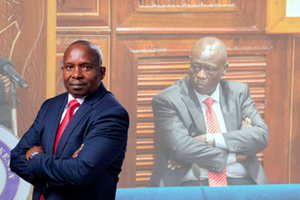
A man betting on European football games with a mobile phone at sports betting shop.
|News
Premium
Lottery epidemic takes root in Kenyan households
As early as six in the morning, Kenya's radio stations begin incessantly urging people to participate in the country's many lotteries. And they do not stop until late at night. Several times an hour, radio presenters give out a Paybill number for gamblers to try their luck at winning the jackpot. And judging by the popularity of these unregulated lotteries, millions of people take part in this search for fool's gold every day.
Kenya is in the deep end of a gambling epidemic. I recently spent two days listening to several Gikuyu vernacular and Swahili stations, and the prevalence of these lotteries should have been of great concern to the authorities by now. But it is business as usual.
Unlike other well-established lotteries, radio presenters do not bother to announce that they have been licensed by the Betting Control and Licensing Board, the government body tasked with regulating the industry.
Radio stations have been known to argue that what they are doing is not really betting at all: they are just administrators of a form of merry-go-round or some such fanciful euphemism. That is splitting hairs; it is gambling, period. And the station owners make a lot of money doing it.
Radio presenters will break from their usual banter to tell listeners that time is running out to take home the jackpot that they must act fast and punch in the M-Pesa number if they want to be proud millionaires.
They paint a fantasy world where everyone is a winner and there are no losers. They tell their listeners as if it is a fait accompli, that winning is almost guaranteed. And when they name the winners, it always turns out to be a low-paid worker. Here is an example of a conversation that took place a few days ago on one of the popular radio stations:
Radio presenter: “Hello, is that Caroline*?”
“Yes, it is.”
“I am so and so from your favourite FM station. Where are you?”
“I am in Murang’a.”
“What do you do for a living Caroline?”
“I am a tea picker.”
“That’s good. Now, did you enter our lottery?”
“Yes, I did.”
“How many times did you enter?”
“Five times yesterday.”
“That’s five hundred shillings, right?”
“Yes, it is.”
“Now Caroline, have you received a message from us?”
“I haven’t checked my phone.”
“Please check and tell us what you see.”
(After a brief pause.)
“Oooi, uuuui my God!”
“Yes, you have won yourself three hundred thousand shillings.”
“Uuui! God is so good! I am going to throw away these tea leaves I was taking to the factory now! I am going to dump them right now!”
Also Listen: Sportpesa - A gamblers' paradise
This is the kind of conversation that gives false hope to millions of Kenyans who have become addicted to the vice.
What these gamblers don't realise is that the chances of hitting the jackpot are about the same as being struck by lightning on a bright sunny day.
One of the most advertised lotteries – the top prize is Sh1 million every hour, and at Easter they were so philanthropic they threw in a Toyota Probox – is packaged in such a way that the odds are stacked against the gambling public.
All you need to enter is Sh50. It doesn't sound like much, but when you have a base of millions of players every day, you start to appreciate how much the lottery owners are making.
The chances of hitting the jackpot in the most popular version of the lottery – getting six numbers out of 49 right – are one in 14 million. These are the odds these people are facing. Nobody tells them that they could be playing every day for the rest of their lives and not win a penny.
These lotteries come in different shapes and sizes. There is one where no matter how much you bet, between Sh20 and Sh120, the presenters solemnly inform you that your money will be multiplied 5,000 times if you are the winner!
Another has a jackpot of Sh100 million, with only Sh100 required to enter the draw. Basic arithmetic shows that at least a million people need to take part just to raise the prize money. If you needed proof that millions of people are spending billions chasing the wind, look no further.
Listening to these stations, it is clear that the target is the lower end of the economic spectrum. Even the presenters seem to take advantage of the myriad problems these people face.
“Are you embarrassed by your financial situation? Perhaps you do not have enough in your pocket to get you through the day? This is your chance to turn the situation around.”
They also invariably invoke the name of God in an attempt to trap as many people as possible.
God only gives to those who pray for something, the presenters say in a voice full of reverence for the Almighty. “You have prayed for that piece of land, you have prayed for that car. This is your time to harvest what you sowed. Just get your phone, enter the lottery and wait for God to work his miracles” they prophesy with a tone of urgency.
Oh, and as for Caroline the tea picker, she was persuaded by the presenters not to throw away the tea leaves. Now that she was 'rich', she was advised to donate the tea leaves to someone who hadn’t won the lottery!




